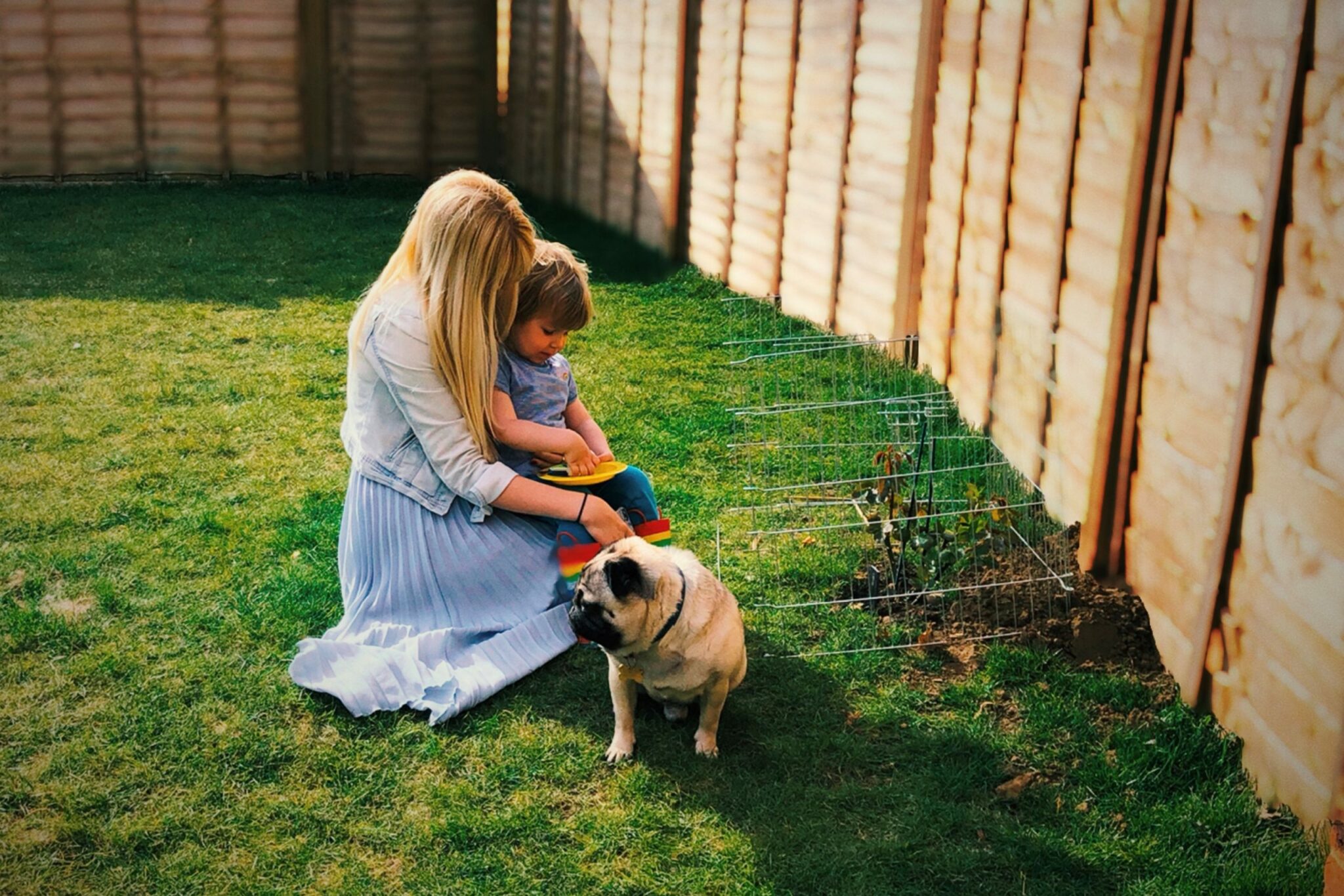أمٌّ لولدين

غداً, كنّا مُتشوّقَين لإخبار العالم عن فلذة كبدنا المنتظرة؛ طفلتنا الثانية، التي كانت في طريقها إلينا. كنّا بالطبع قد أخبرنا عائلتنا وبعض الأصدقاء المُقرّبين. وفي خضم موجة الجنون التي أصابت العالم أجمع، والجو العام المشحن بالتوتر جرّاء جائحة كورونا، أتت بُشرتنا السارة بمثابة بصيص نور. وهذا بالضبط ما شعرنا به.
أخذنا موعداً خاصاً لإجراء صورة بالموجات فوق الصوتية. شعرتُ بنفس التوتر الذي شعرتُ به في المرّة السابقة؛ هل سيكون طفلنا بخير؟ هل كنّا على وشك أن نُصبح واحداً من كل أربعة أشخاص يفقدون طفلاً؟ أعتقد أنّه من الطبيعي أن تقلقي فيما تقتربين من القيام بأول صورة بالموجات فوق الصوتية لكِ؛ ولطالما اختلفتُ مع فكرة عدم إخبار أحدٍ عن الحمل إلى حين بلوغ الشهر الثالث إذ يُشعر ذلك الوالدين أنَّ طفلهم قبل هذه الفترة هو مُجرّد رقم إحصائي آخر. وأنا أؤمن بأنّه يجب أن تُخبري الجميع عن حملكِ عندما تريدين ومتى تريدين، سواء كان ذلك في الأسبوع 5 أو 10 أو 12 أو في الشهر 6 أو حتّى إذا كنتِ تريدين أن تصرخي بأعلى صوتكِ فور انتهاء الدقيقتين وظهور خطّين أزرقين في فحص الحمل، تماماً حيث أردتهما. ولكن على الرغم من ذلك، لا يسعكِ إلّا أن تقلقي. استلقيتُ على السرير، أنزلتُ بنطالي ورفعتُ قميصي، شعرتُ بالسائل اللزج البارد على بطني الذي كان أيضاً صلباً نتيجة امتلاء المثانة وقمتُ بحبس أنفاسي.
لم تستغرق أخصائية الموجات فوق الصوتية وقتاً طويلاً لإيجادها. وقامت بتهنئتي بطفلتي وبقدرتي على شرب الكثير من الماء لدرجة أنَّ مثانتي المنتفخة جعلت طفلتي مرئية على الشاشة. “مبروك!” قالت ذلك مراراً وتكراراً. إنهمرت دموع الفرح الصامتة من عينيّ حتّى وصلت إلى شعري بينما كنتُ أشاهد الموجات فوق الصوتية وضربات قلب طفلتي على الشاشة أمامي. ضغط جوناثان على يدي وابتسم لي. لطالما أحببته لعدّة أسباب، ولكن هناك شيء فريد من نوعه في علاقة الحبّ التي تجمعنا ليس فقط كشريكين ولكن أيضاً كوالدين. قامت أخصائية الموجات فوق الصوتية بالتقاط الصور وحفظ مقاطع الفيديو لإرسالها لنا عبر البريد الإلكتروني. أرتنا رأس طفلتنا وبداية قدميها؛ حتّى أنّها استطاعت أن تُخبرنا عن المبيض الذي أطلق البويضة المسؤولة عن نموها. غادرنا مع ظرف مليء بالصور وقلوب مليئة بالأمل. وضعنا أحلاماً لها ولكن أخذنا أيضاً بعين الاعتبار الإحصائيات؛ بمُجرّد رؤية ضربات قلب الطفل، ينخفض خطر الإجهاض الإجمالي إلى 4%. وبعد 8 أسابيع، ينخفض هذا الخطر مجدداً إلى 1.6 – 2% وهو تقريباً نفس معدّل الخطر بعد الأسبوع 12… وهو الوقت الذي يرى فيه المجتمع أنَّ الخطر منخفض بما يكفي لمشاركة الفرحة مع الآخرين.
وعندما علمنا أن نسبة الخطر لدينا هي حوالي 2%، شعرنا بقليل من الراحة. إذ تكون جميع حالات الحمل مقلقة إلى حد ما. فأنتِ لا تشعرين فقط بالسعادة أنّكِ حامل عندما تتمكّنين من خفض فرص الإجهاض لديكِ من الناحية الإحصائية؛ بل تبدأين بالتخطيط لحياته وتحلمين كيف ستكون وتقعين في حبّ الحياة التي تنمو في داخلكِ منذ اللحظة الأولى التي تكتشفين فيها أنّكِ حاملٌ بهذا الطفل الذي لطالما رغبتِ به. ولكن بمُجرّد رؤيته مرّة واحدة والتأكّد من أنّه بخير، ينتابكِ شعورٌ لا يُمكن تفسيره. فأنتِ ما زلتِ تُحبّينه تماماً كما فعلتِ عندما لم تري سوى خطّين، ولكن يُصبح التخطيط والحلم في هذه المرحلة أكثر واقعية. وقد أخبركِ شخصٌ آخر، شخصٌ مُدرّب طبيًا للقيام بذلك، أنَّ الأمل الذي تحملينه في داخلكِ ينمو. ولم يعد مُجرّد أملٍ. بل أصبح حقيقة. وبعيداً عن العاطفة، أصبح حملكِ وطفلكِ قابلَين للحياة من الناحية الطبية. ولا يوجد سببٌ حتى الآن يمنعكِ من حمل طفلكِ بين ذراعيكِ بعد سبعة أشهر.
أخبرنا هاري عن الموضوع. فهو يحبّ الأطفال. جميع الأطفال. الأطفال الذين يراهم على التلفاز، وفي عربات الأطفال، وأطفال أصدقائي، وأقاربه الصغار، ولعبته … فهو مهووس بالأطفال. وهو لطيف وحنون معهم. يرغب دائماً في تقبيل خديهم الممتلئين ومُداعبة رؤوسهم الصغيرة. وعندما لا يكونون متواجدين، يتذكّرهم دائماً ويسألني أين هم وإذا كانوا بخير. كما يسألني أيضاً متى يُمكنه رؤيتهم مرة أخرى وأنّه يرغب في غناء “Baby Mine” لهم، تماماً كما أفعل له. فكان من الطبيعي أن نخبره بأنّني حامل، خاصةً بعد أن علمنا أنَّ طفلتنا بخيرٍ.
كان مُتحمّساً جداً. كان يسأل كل يوم ما إذا كان الطفل بخير. يصعد إلى فراشنا في الصباح وبعد أن يُعانقني، كان يرفع قميص نومي ويضع خده على بطني المنتفخ ويقول بلطف “صباح الخير أيتها الطفلة”. كان دائماً يسألني ما إذا كانت ستلعب معه عندما تُولد. وكنت أجيبه ببهجةٍ “بالطبع ستفعل.” “هي أختك الصغيرة. في البداية ستكون صغيرة لذا يُمكنك مُساعدتي في الاعتناء بها. ولكن عندما تكبر، ستتعلّم المشي واللعب والتحدّث ويمكنك حينئذٍ أن تلعب معها دائماً.” أعتقد أنّه كان مُتحمّساً مثلنا تماماً.
ومن ثمَّ خسرناها. الصورة التالية. شاشة أخرى. طبيبة هذه المرة. لقد أصبحت أكبر الآن، وقيل لي إنّه لا داعي أن تكون مثانتي ممتلئة هذه المرّة. لم يكن جوناثان متواجداً معي. فبسبب هذا الفيروس الخفي الذي اجتاح العالم بأسره، لم يعد يُسمح بوجود شخصٍ آخر. كنتُ مستلقية بمفردي في غرفة صامتة أستمع إلى الصمت الصاخب في داخلي. وأشاهد على الشاشة طفلتي نائمة في سكون مخيف. رأيتُ نظرات تعاطف وحزن في عينيّ الطبيبة وأومأت لها برأسي حتّى قبل أن تخرج الكلمات من فمها. وعلى الرغم من أنّها أخبرتني ما الذي حدث، لم تكن بحاجة أن تنطق بأي كلمة. عرفتُ. ومرّة أخرى، كنتُ أشاهد الموجات فوق الصوتية على الشاشة أمامي، وبدأت تنذرف الدموع من عينيّ حتّى وصلت إلى شعري، ولكن هذه المرّة لم تكن دموعَ فرحٍ؛ فبدأت تنهمر بغزارة، مبللةً بشرتي وشعري ووسادة الطبيبة البيضاء بينما كان يرتجف جسمي مع كل دمعة لم أستطع أن أحبسها في داخلي وبدأتُ أحدّق في جسد طفلتي، أود أن أراه يتحرّك ولكنني أعرف في أعماقي أنّه لن يتحرّك مجدداً.
شرحت لي الطبيبة أنَّ طفلتنا قد تُوفّيت قبل أسبوعين. كانت مُتمسّكة بوالدتها وكان جسمي مُتمسّكاً بها. وخلال هذه الفترة، كنتُ لا أزال أعاني من الغثيان في الصباح كما استمرت معدتي في التوسّع واحتفظتْ بالماء مع زيادة مستويات الهرمونات لديّ إضافة إلى استمرار نمو ثديي وانتفاخهما وآلام حادة فيهما بينما كانا يُواصلان الاستعداد لتغذية طفل ميت. إنّها ظاهرة قاسية ولكنّها ليست نادرة جداً؛ يُطلق عليها اسم “الإجهاض الفائت”. وهو بشكلٍ أساسي، عندما يموت طفلكِ من دون أن ينتبه جسمكِ لذلك. وبالتالي، يستمر الحمل وتستمر أعراضكِ ولكن تكون الحياة التي تنمو في داخلكِ قد توقّفت. عادة، في حالات الإجهاض، تخرج أنسجة الحمل والجنين من الجسم بعد فترة قصيرة من وفاة الطفل ولكن في حالتي، و3% غيري على ما يبدو، ظلّت طفلتي آمنة ومرتاحة في دفء الرحم لديّ.
شعرتُ بالصدمة والراحة في الوقت نفسه بعد معرفة هذه المعلومة. لأنني لم أستطع تقبّل فكرة أنّني كنتُ أتجوّل وأشعر بسعادة غامرة لأنَّ حملي يتطوّر وأترقّب الفرحة التي سأشعر بها أثناء الصورة المقبلة، بينما كانت طفلتي في هذه الأثناء ميتة في داخلي. ومن ناحية أخرى، أحببتُ فكرة أنّها لا تزال في داخلي، ربّما هذا شعورٌ غريبٌ وغير منطقي بعض الشيء، ولكنني أحببتُ فكرة أنها كانت تشعر بالأمان معي بعد أن لم تعد تشعر بأي شيء. أردتُ أن أبقيها في داخلي إلى الأبد. وإذا كان بإمكاني فعل ذلك، فأنا مُتأكّدة من أنني كنتُ سأفعل. إلّا أنّني كنتُ على وشك أن أكتشف أنَّ الاحتفاظ بها ليس ضمن الخيارات المطروحة.
كان لديّ خيار واحد فقط بفضل فيروس كورونا. ولكن في معظم الحالات، يكون هناك ثلاثة خيارات: العلاج الطبيعي (انتظار أن يتخلّص الجسم من الحمل بمفرده) والعلاج الطبّي (حلقات مهبلية لتحفيز الجسم على التخلّص من الحمل) والعلاج الجراحي (تخدير عام ومن ثمَّ كحت أنسجة الحمل من الرحم). لم أكن أرغب في إجراء عملية جراحية؛ وذلك لأنني أخاف من التخدير العام من جهة ولأنني شعرتُ بالقلق عند سماع كلمة “كحت” من جهة أخرى. ولحسن الحظّ، لم تكن تُعتمد العملية الجراحية كخيار أول خلال الجائحة الحالية. نصحتني الطبيبة بعدم اللجوء إلى العلاج الطبيعي بسبب الوقت الذي مضى من دون أن يُدرك جسمي الحاجة إلى التخلّص من الحمل؛ وفي حال مضى وقت طويل جدًا، فقد يُؤدّي ذلك إلى مُضاعفات. لهذا السبب، لم يبقَ لديّ سوى العلاج الطبّي. وقامت الطبيبة بتحضير كل شيء. سيكون هناك يومان كاملان بين الصورة والعملية. غادرتُ المستشفى لأخبر جوناثان عن وفاة طفلتنا ولكي لا أدع هاري يراني في هذه الحالة.
عدتُ إلى العمل في اليومين التاليين. لم أكن أعرف ماذا أفعل. لم أقم بذلك لأنني شعرتُ أنّني مضطرة أن أعود إلى العمل. وكان معظم زملائي يعرفون عن الحمل لذا أخبرتهم عن الوفاة أيضاً. سُمِحَ لي بأخذ كل الوقت الذي أحتاجه للتعافي وحصلتُ على الكثير من الحبّ والدعم. ولو حصل ذلك في ظروف طبيعية، أي عدم وجود جائحة عالمية، ما كنتُ لأعود إلى العمل. فكنتُ أعمل من المنزل ولكنني أردتُ أن أبتعد عن هاري. لقد بكيتُ كثيراً في الأيام القليلة الأولى، ولكن على الأقل لن يراني هاري وأنا أعمل في مكتبي. وما زلت أجهش بالبكاء من وقتٍ لآخر من دون أن أتمكّن من السيطرة على ذلك. وخلال الأيام التي سبقت العلاج الطبّي، كان دماغي يُعاني من جفافٍ وجسدي يبكي على خسارة طفلتي. أردتُ فقط أن أستعيدها. وما زلتُ أود ذلك.
بدا الأمر غريباً في تلك الأيام، إذ كنتُ أختبئ من عائلتي حتّى لا ينزعج طفلي الحيّ عندما يراني حزينة على طفلي الميت. ولكن في النهاية، أخبرنا هاري الحقيقة واستطعتُ بطريقة ما عدم البكاء. إنّه لأمرٌ مدهش كيف يُمكننا كأمّهات أن نستمد قوتنا من لا شيء من أجل حماية أطفالنا. بدأ هاري بالبكاء. كانت صرخة مؤلمة تقع بين الحسرة ونوبة الغضب. لقد زاد من ألمي أن أعرف أنّه في رحمي طفل ميت وفي حضني طفل يتألّم فيما لم يكن بوسعي القيام بالكثير. حاولنا تهدئته وإخباره عمّا حصل بلطف واختصار ووضوح وبطريقة يفهمها طفلٌ يبلغ سنتين ونصف. أخبرناه أنّه من الطبيعي أن يشعر بالحزن. فأمّك وأبوك حزينان أيضاً. وأخبرناه أنّها ستبقى دائماً أخته الصغيرة وأنّها تُحبّه كثيراً. وأنّه يُمكننا أن نزرع لها شجية ورد في الحديقة حيث يُمكننا أن نتذكّرها ونتحدّث إليها. وأخبرناه أنَّ أمّه وأباه سيحاولان مرّة جديدة وضع طفل آخر في بطن أمّه على أمل أن نصطحب هذه المرّة الطفل إلى المنزل ليعيش معنا ولكن للأسف لم يتمكّن الطفل السابق من العيش معنا. كانت هذه الطفلة صغيرة جدًا ولا يُمكنها العيش معنا في منزلنا ولكنّها ستعيش دائماً في قلوبنا. لن تكبر هذه الطفلة أبداً ولكنّها ستبقى معنا إلى الأبد.
وأعتقد أنَّ الأيام التالية، والتي كانت في الواقع يومين فقط بين ذلك الحين والآن قد بدت وكأنّها ثوانٍ وسنوات في الوقت نفسه، تستحق مقالاً خاصاً بها عوضاً عن وضعها في هذا المقال. لقد كانت أياماً مليئة بآلام جسدية ونفسية على حد سواء. كانت أياماً مليئة بلحظات حسرة ولحظات سأعتز بها دائماً. كانت أياماً مليئة بالحب وشعور بالفراغ لم أختبره من قبل. سوف يبقى هذا الأسبوع وهذه الأيام معي إلى الأبد. تماماً كطفلتي.
وربما كما تشعرين أيضاً في حال ما زلتِ تقرأين هذا المقال الذي يحتوي على أكثر من 2000 كلمة. لذا، إذا ما زلتِ تقرأين، فشكراً لكِ. كانت طفلتي على قيد الحياة وتستحق أن تُعرف. اسمها أوليفيا.
***
نُشِرَ هذا المقال في البداية في 27 مارس على مُدوّنة روزي الشخصية، كلمات لأوليفيا.
عن الكاتبة
تبلغ روزي 28 عاماً وتعيش في أكسفورد مع زوجها وابنهما هاري وكلبهم نايجل. وهي أمّ لثلاثة أولاد، هاري الذي يبلغ الآن ثلاث سنوات وأوليفيا التي فقدتها للأسف في مارس من هذا العام وهي حاملٌ حالياً بطفلها الثالث. روزي حائزة على شهادة في الأدب الإنجليزي والكتابة الإبداعية ولطالما استمتعت بالكتابة. منذ أن فقدت أوليفيا، وجدت روزي أنَّ الكتابة والتحدّث عن الإجهاض ذات تأثير علاجي رائع على امل دعم النساء اللواتي اختبرن هذه التجربة أيضاً.










